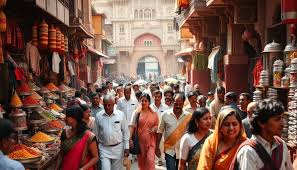Exploring the State’s Contributions to India’s Cultural and Intellectual Foundation
Lucknow – Uttar Pradesh, often regarded as the cultural and spiritual heart of India, plays an unparalleled role in shaping the national identity. Home to ancient traditions, diverse philosophies, and historical movements, the state has profoundly influenced India’s intellectual and cultural evolution. From its sacred sites to its revolutionary thinkers, Uttar Pradesh’s legacy continues to define the essence of India.
Key Metrics
- Population Impact: Uttar Pradesh is home to over 16% of India’s population, making it a significant contributor to the country’s socio-cultural dynamics (Census 2011).
- Religious Heritage: The state hosts 22 UNESCO-recognized sites, including the Buddhist stupas of Sarnath and the iconic Taj Mahal (UNESCO World Heritage Centre).
- Tourism Contribution: With over 535 million visitors annually, Uttar Pradesh leads the nation in cultural and spiritual tourism (Uttar Pradesh Tourism Department, 2023).
- Literary Influence: The state has produced notable writers, including Premchand and Mahadevi Verma, whose works have shaped India’s literary canon.
Philosophical Foundations Rooted in Uttar Pradesh
1. Vedic Traditions and Advaita Vedanta
Uttar Pradesh is home to key Vedic centers like Prayagraj, where the Kumbh Mela celebrates the pursuit of knowledge and spiritual awakening.
- Advaita Vedanta: The philosophy of non-dualism, propagated by Adi Shankaracharya, has deep roots in the state, particularly in Varanasi. This belief in the unity of existence has shaped Indian thought for centuries.
- Relevance Today: Educational initiatives and yoga camps across the state continue to promote these ancient teachings, making them accessible to modern audiences.
2. Bhakti and Sufi Movements
The Bhakti movement, championed by saints like Kabir and Tulsidas, emerged in Uttar Pradesh as a response to rigid orthodoxy, emphasizing devotion and inclusivity.
- Sufi Influence: Shrines like Dargah Sharif in Ajmer and Ala Hazrat in Bareilly symbolize the state’s syncretic ethos, blending spiritual philosophies of love and harmony.
Contributions to National Movements
1. The Freedom Struggle
Uttar Pradesh was a hotbed of India’s independence movement, with leaders like Jawaharlal Nehru, Sardar Patel, and Rani Lakshmi Bai shaping its trajectory.
- Philosophical Impact: The principles of ahimsa (non-violence) and satyagraha (truth-force), central to Gandhi’s ideology, found strong resonance in Uttar Pradesh’s towns and villages.
- Historical Events: The Kakori Train Robbery (1925) and the Chauri Chaura incident (1922) are emblematic of the state’s role in mobilizing grassroots resistance.
2. Social Justice Movements
Dr. B.R. Ambedkar’s influence is particularly significant in Uttar Pradesh, where Dalit movements continue to draw inspiration from his vision of equality and empowerment.
- Example: Political reforms and grassroots activism in the state reflect Ambedkarite ideals, striving to bridge socio-economic divides.
Cultural and Artistic Contributions
1. Literary Heritage
- Premchand’s Realism: The celebrated writer’s works highlight the struggles of rural India, giving voice to marginalized communities.
- Mahadevi Verma’s Feminism: As a pioneer of Hindi literature, Verma’s poetry and essays championed women’s rights and individuality.
2. Music and Dance
- Kathak: Lucknow’s gharana of Kathak exemplifies the fusion of Mughal and Hindu traditions, making it a globally recognized classical dance form.
- Folk Traditions: Songs and dances like Rasiya and Birha reflect the state’s cultural diversity and philosophical depth.
Challenges to Preserving Identity
- Modernization and Commercialization: The rise of tourism and urbanization risks reducing cultural practices to mere spectacles, stripping them of their philosophical depth.
- Religious Polarization: Growing political tensions threaten the syncretic harmony that defines Uttar Pradesh’s heritage.
- Generational Disconnect: Younger generations often view traditional practices as outdated, necessitating efforts to bridge the gap through education and digital engagement.
Future Directions
1. Promoting Philosophical Education
- Curriculum Integration: Include teachings from saints like Kabir, Tulsidas, and Premchand in school syllabi to foster cultural awareness.
- Public Programs: Expand initiatives like yoga camps and literary festivals to make philosophical concepts accessible to all.
2. Encouraging Interfaith Dialogues
- Strengthen platforms for communal harmony through events and cultural exchanges, drawing inspiration from Sufi-Bhakti traditions.
3. Leveraging Digital Platforms
- Document and disseminate the state’s philosophical and cultural heritage through apps, podcasts, and multimedia content, engaging younger audiences.
Conclusion
Uttar Pradesh’s philosophical legacy is a cornerstone of India’s national identity. Its contributions, from spiritual movements to socio-political reforms, continue to inspire unity, resilience, and ethical living.
In an era of rapid change, preserving and promoting these philosophies is not just a regional necessity but a national imperative. Uttar Pradesh stands as a testament to the enduring power of ideas that transcend time, bridging the past with the present to guide the future.


Leave a Reply